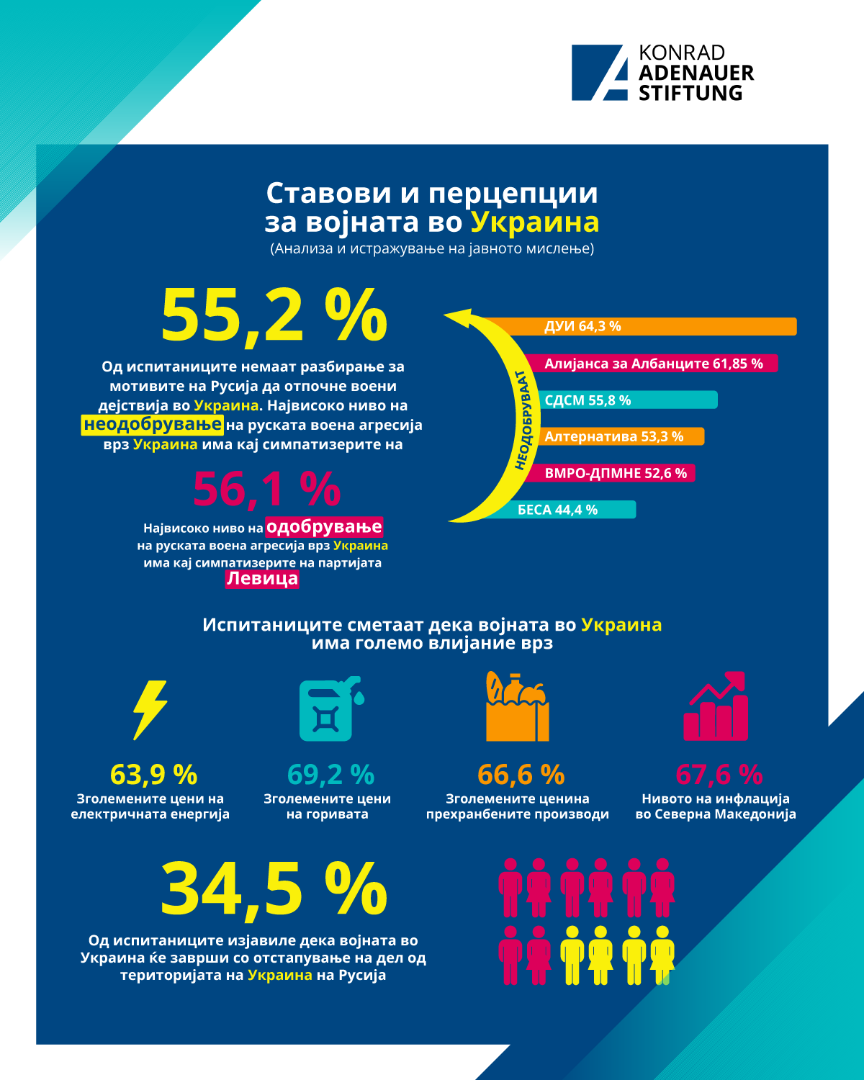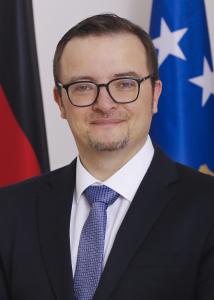The publication is composed of a theoretical analysis and a public opinion survey, aiming to shed light on the position of the institutions of North Macedonia, the key political parties and politicians, as well as the public in general regarding this topic.
The public opinion survey was conducted in mid-November 2022.
The sample size includes 1121 respondents, respecting key demographic characteristics, i.e. gender, age over 18, education and ethnicity; geographical balance; party and political affiliation of the respondents.
During the implementation of the poll, a quantitative research methodology of data collection was used (via a telephone survey), which enables a reliable and precise scanning of the attitudes of the general population.
The margin of error ranges between +/- 2.9% with a 95% confidence interval.
The poll was conducted by the Institute for Political Research (IPIS).
The questionnaire consists of a control question and main questions. The first, control question, determined the level of awareness of the respondents about the war in Ukraine and the survey was conducted only with those respondents who answered affirmatively to the first question.
The main questions of the survey can be divided into four groups:
In the first group, questions of a general nature have been inserted to determine the attitudes of the respondents regarding the issue of guilt, motives and effects of the war in Ukraine;
In the second group, questions related to economic sanctions against Russia, as well as aid in weapons and equipment for Ukraine, have been inserted;
In the third group, questions related to the effects of the war in Ukraine on the standard of living of the citizens of North Macedonia have been inserted;
In the fourth group, summary questions have been inserted that refer to the duration of the war in Ukraine, its outcome, as well as the consequences it will leave on the world as a whole.
Based on the survey results, the following more distinctive conclusions can be drawn:
55.2% of respondents have no understanding of Russia's motives for starting military actions in Ukraine. By cross-referencing respondents' answers with their party affiliation, two groups are differentiated. The first group includes respondents who do not justify Russia's military aggression against Ukraine, with the highest level of disapproval of Russian military aggression against Ukraine among DUI sympathizers (64.3%), followed by supporters of the Alliance for Albanians (61 .85 %), SDSM (55.8 %), Alternativa (53.3 %), VMRO-DPMNE (52.6 %) and BESA (44.4 %). The second group, on the other hand, includes those respondents who justify Russia's military aggression against Ukraine, with the highest level of approval of Russian military aggression against Ukraine among supporters of the Levica party (56.1%);
21.9% of the respondents believe that the responsibility for the outbreak of the war in Ukraine lies exclusively with Russia, 4.1% believe that the responsibility lies in Ukraine itself, while 16.8% believe that both Russia and Ukraine are equally responsible. In addition, 19.4% of respondents cannot determine who is to blame, while 37.8% believe that it is someone else;
88.4% of respondents answered that the war in Ukraine caused negative emotions to them, i.e., emotions of fear, shock, disbelief, sadness, anger, etc.;
49.5% of respondents stated that due to the war in Ukraine, their personal security and the security of the state has deteriorated;
61.2% of respondents stated that they do not justify the aid in weapons and equipment that North Macedonia gives to Ukraine. In addition, 61.6% of respondents stated that they do not justify North Macedonia's economic sanctions against Russia. The comparison of the answers from the first part with the answers from this part points to the conclusion that the citizens condemn the Russian military aggression against Ukraine, but are reserved regarding the intervention of North Macedonia through aid in weapons and equipment for Ukraine, as well as through economic sanctions against Russia;
63.9% of the respondents believe that the war in Ukraine has a great impact on the rising prices of electricity, 69.2% on the rising prices of fuel in the country, 66.6% on the rising prices of food products, and 67.6% of respondents believe that the war in Ukraine has a great influence on the level of inflation in North Macedonia;
Regarding how much longer the war in Ukraine will last, a large division between the respondents can be noticed, with 26.6% believing that the war will last for several years, 21.9% for up to a year, while 16.1% for a few more months;
34.5% of the respondents stated that the war in Ukraine will end with the cession of part of the territory of Ukraine to Russia; 15.3% with a complete military victory of Russia; 10.1% with a complete withdrawal of Russia from Ukraine and 8.1% with a complete military victory of Ukraine. In this sense, 29.7% of respondents did not provide an answer to this question. By cross-referencing respondents' answers with their party affiliation, it can be noted that among all respondents from all political parties, the most common answer is that the war will end with Ukraine’s ceding of part of its territories to Russia;
55.6% of respondents believe that due to the war in Ukraine, the world will face greater instability and more military conflicts in the future, compared to 20.5% who believe that the situation will not change. By cross-referencing the answers of the respondents with their party affiliation, it can be concluded that among all the respondents, regardless of which party they support, the most common answer is that the war in Ukraine will cause the world to face much more instability in the future and military conflicts.





